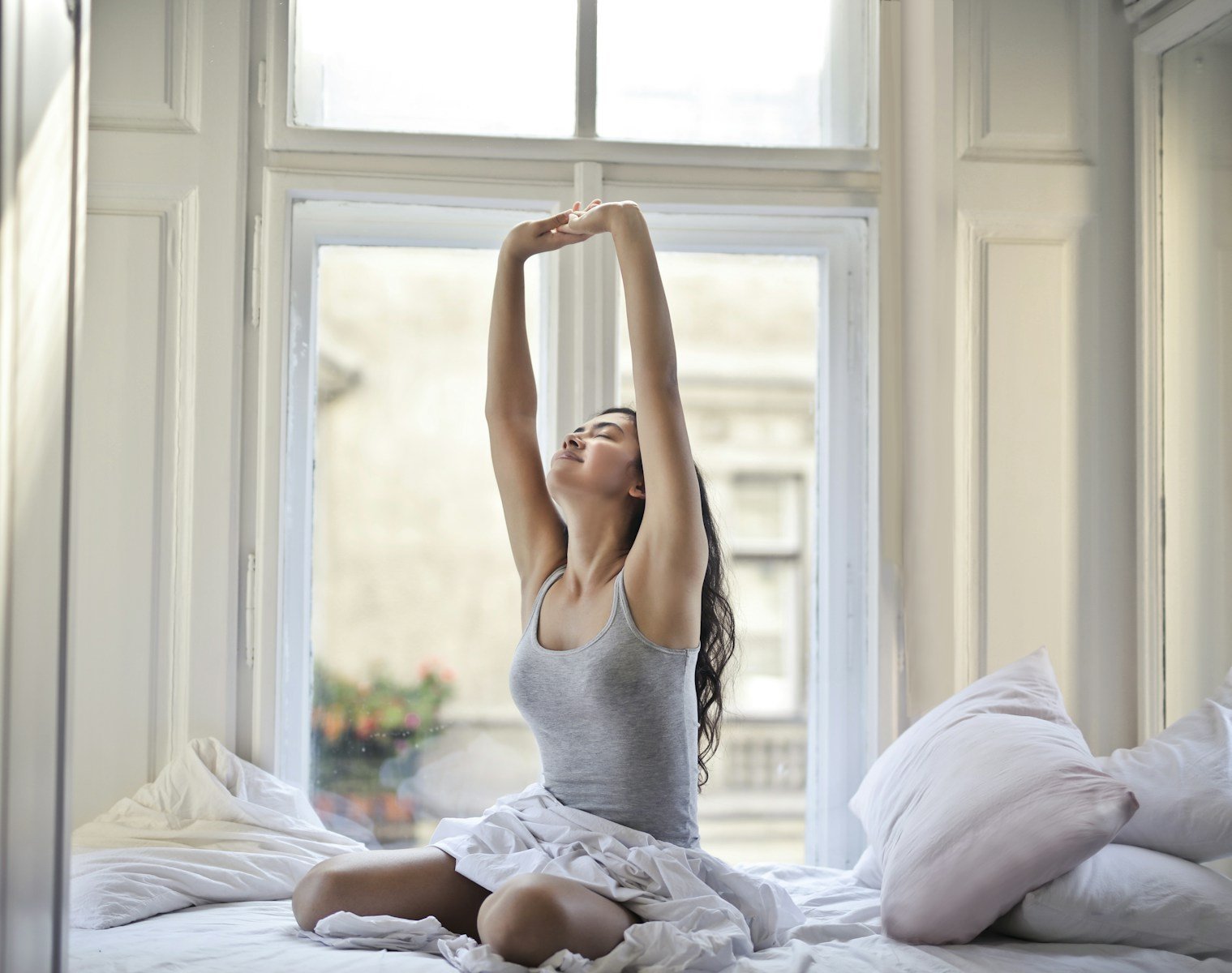How to Sleep Better and Wake Up Energized
Over time, achieving better sleep can transform the way you feel and function throughout your day. If you often find yourself waking up groggy or struggling to stay awake, it’s time to assess your sleep habits. This guide will provide you with prac Instant Images tical tips and insights to help you cultivate a restful sleep environment, establish a bedtime routine, and ultimately wake up feeling rejuvenated and energized. Let’s probe effective strategies that will enhance your sleep quality and improve your overall well-being.
Key Takeaways:
- Establish a consistent sleep schedule by going to bed and waking up at the same time every day, even on weekends.
- Create a relaxing bedtime routine, which may include activities like reading, meditating, or taking a warm bath to signal to your body that it’s time to wind down.
- Optimize your sleep environment by keeping your bedroom cool, dark, and quiet, and invest in a comfortable mattress and pillows.
- Limit exposure to screens and bright lights at least an hour before bedtime, as the blue light can interfere with your body’s natural sleep-wake cycle.
- Be mindful of your diet; avoid heavy meals, caffeine, and alcohol close to bedtime to promote better sleep quality.
Redefining Your Sleep Sanctuary
The Power of an Optimized Environment
Creating a sleep sanctuary goes beyond just having a comfortable mattress. Your bedroom should be a haven that actively promotes relaxation and restful sleep. Light, sound, and even scent can significantly influence your ability to drift off at night. Darkening your room with blackout curtains can block out ambient light, which has been shown to enhance melatonin production and signal your body that it’s time to wind down. Additionally, incorporating soundproofing methods, such as heavy drapes or sound machines, can dampen disruptive noises, ensuring that your sleep remains uninterrupted.
Color psychology plays a meaningful role in creating that serene atmosphere too. Soft, muted hues like blues, greens, and neutrals create tranquility, while vibrant colors can trigger stimulation. The optimal temperature for sleep should also be a priority; maintaining your bedroom between 60 and 67 degrees Fahrenheit helps your body regulate its internal temperature, setting the stage for deep, restorative slumber.
Essential Elements for a Restful Bedroom
The necessarys of a restful bedroom extend beyond just aesthetics; they also encompass functionality. A quality mattress suited to your sleeping style can greatly improve your comfort. Whether you prefer a soft, plush surface or a firmer feel, investing in the right mattress is vital. Complementing your mattress with a supportive pillow that aligns with your neck and head can prevent soreness and enhance your overall sleep experience.
The bedding you choose will also impact the quality of your sleep. Luxurious, breathable fabrics like cotton or bamboo ensure that you remain comfortable throughout the night, regulating your body temperature while you rest. Incorporating a simple yet effective decluttering strategy can further encourage relaxation. A tidy space allows your mind to unwind, limiting distractions and promoting deeper sleep.
Creating your ideal sleep environment doesn’t have to be overwhelming. Start by evaluating what elements in your bedroom currently enhance or hinder your sleep quality. Consider what scents you find comforting, and incorporate those through necessary oils or candles when preparing for bedtime. Personalizing your space with items that make you feel relaxed, whether that’s a family photo or a cozy throw blanket, can transform your bedroom into a sanctuary that invites restful sleep and rejuvenation.
The Bedtime Rituals for Restorative Sleep
Creating a Pre-Sleep Routine
Your body thrives on predictability, especially when it comes to relaxation and sleep. Establishing a pre-sleep routine signals your body that it’s time to wind down. Consider incorporating activities like reading a book, taking a warm bath, or practicing mindfulness meditation into your nightly ritual. These calming activities can lower your heart rate and kickstart the release of sleep-inducing hormones. Allow yourself at least 30 minutes of off-screen time to reduce exposure to blue light, which can interfere with melatonin production and disrupt your body’s natural sleep cycles.
Establishing a Consistent Sleep Schedule
Regularity in your sleep patterns plays a significant role in how quickly you fall asleep and how rested you feel upon waking. Strive to maintain a consistent sleep schedule by going to bed and waking up at the same time every day, even on weekends. This practice stabilizes your body’s internal clock, making it easier for you to drift off and wake up feeling refreshed.
The benefits of a consistent schedule extend further than just sleep. Research has shown that individuals who adhere to a routine experience better overall health outcomes, including improvements in mood and cognitive function. By prioritizing this simple yet effective habit, you’re setting yourself up for a productive and energized day ahead. Adjusting to a new schedule might take time, so consider gradually shifting your bedtime and wake time by 15 to 30 minutes, helping your body adjust smoothly to your desired routine.
The Role of Nutrition and Hydration in Sleep Quality
Nutrition and hydration are often overlooked when it comes to improving sleep quality. Certain foods can help you wind down and promote restful sleep, while others might keep you tossing and turning throughout the night. Focus on incorporating nutrient-dense options into your evening meals. Foods rich in magnesium, such as spinach, nuts, and seeds, can help relax your muscles. Additionally, complex carbohydrates like whole-grain bread or brown rice can help produce serotonin, a hormone that aids in regulating sleep. Ensuring your last meal is well-balanced and consumed a couple of hours before bedtime can set the stage for a restful night.
On the other hand, some foods tend to disrupt your sleep cycle. Spicy dishes and heavy, fatty meals can lead to indigestion and discomfort, making it hard to fall asleep. Processed sugars and refined carbs might provide a quick energy boost, but they can also spike your blood sugar levels, resulting in restless night. Paying attention to what you eat before bed can significantly affect your overall sleep quality.
Foods to Favor and Avoid Before Bed
Opting for sleep-friendly snacks like a banana or a small serving of cherries can do wonders for your rest. These fruits contain melatonin, a hormone that regulates sleep-wake cycles. A cup of herbal tea, such as chamomile or valerian root, can also enhance relaxation and soothe your mind as you prepare for bedtime. Whole foods that are rich in antioxidants, like berries, and omega-3 fatty acids, found in fish like salmon, can also support better sleep by helping reduce inflammation that might interfere with quality rest.
Avoiding heavy or rich foods before you hit the hay is just as crucial. Large meals can put a strain on your digestive system, making it difficult to drift off. Even more important is steering clear of sugary snacks and caffeinated beverages. Simple adjustments like swapping out dessert for yogurt with a drizzle of honey may leave you feeling satisfied without sacrificing your sleep.
The Impact of Caffeine and Alcohol on Your Slumber
Caffeine consumption can significantly disrupt your sleep patterns, often lingering in your system for up to eight hours. This stimulant, found in coffee, tea, and many soft drinks, keeps you alert and awake at the most inconvenient times. If you find yourself consuming caffeine in the afternoon or early evening, it might explain those restless nights. It’s not only the amount of caffeine but also the timing that matters when it comes to your overall sleep quality.
Alcohol is often regarded as a sleep aid, but the reality is quite different. While it might help you fall asleep faster, it typically disrupts the latter half of your sleep cycle, leading to more frequent awakenings. You may feel drowsy after drinking, but that enticing initial relaxation can transform into sleep fragmentation. In fact, research suggests that consuming alcohol within a few hours of bedtime can lead to a less restorative sleep, leaving you groggy and unrefreshed in the morning.
Techniques for Calming Your Mind and Body
Mindfulness and Relaxation Exercises
Engaging in mindfulness and relaxation exercises can significantly diminish the mental chatter that often bubbles to the surface as you wind down for the night. Techniques such as deep breathing, meditation, or guided imagery can help center your thoughts and calm your body. You might find that simply sitting in a quiet space, focusing on your breath, and counting each inhalation and exhalation can create a powerful sense of tranquility. For example, practicing a short ten-minute meditation before bed can help shift your focus away from the stressors of the day, allowing for a more peaceful transition into sleep.
The Benefits of Progressive Muscle Relaxation
Progressive muscle relaxation (PMR) is a technique that systematically tenses and then relaxes different muscle groups throughout the body. This practice can not only help you identify areas of tension but also promote a greater overall sense of relaxation. Engaging in PMR for just ten minutes each night has been shown to diminish anxiety levels and foster better sleep quality. Focusing on the contrast between tension and relaxation helps you become more aware of your body’s responses, enabling you to let go of stress more effortlessly as you prepare for rest.
The impact of PMR extends beyond the immediate calming effects. Studies have indicated that regular practice can lower blood pressure and decrease symptoms associated with anxiety and insomnia. As you progress through each muscle group, from your toes to your head, the cumulative benefits can lead to a profound reduction in physical and mental tension. This increased awareness and control over muscle relaxation can not only enhance your nighttime rest but also improve your overall health and mindfulness throughout daily activities.
Leveraging Technology for Sound Sleep
Sleep Tracking Devices and Apps
Keeping a pulse on your sleep patterns can offer transformative insights into your nightly routine. Sleep tracking devices, such as fitness bands or dedicated smartwatches, utilize advanced sensors to monitor your heart rate, movements, and even the phases of your sleep cycle. By analyzing this data over time, you can identify factors that contribute to restless nights. Apps like Sleep Cycle or Pillow can sync with these devices, providing you with detailed reports that highlight trends and help you make informed adjustments to enhance your sleep quality. Users have reported improvements in their sleep efficiency and duration, often just by tweaking bedtime habits based on feedback from their devices.
The customizable features offered by some sleep tracking apps allow you to set personal goals and receive gentle reminders to go to bed. With options like sleep sounds, sleep calculators, and wake-up alarms that match your natural sleep phases, you can leverage technology to create a tailored sleep experience that caters specifically to your needs. You might find that monitoring your sleep results not only educates you on your habits but also motivates you to adopt a more disciplined bedtime routine.
Harnessing White Noise and Sleep Aids
In a world filled with distractions, white noise machines or apps can provide the serene backdrop required for deeper sleep. These devices produce a consistent sound that masks disruptive noises, making it easier for you to drift off and stay asleep. Studies indicate that individuals who use white noise tend to fall asleep faster and experience fewer awakenings during the night. Some popular choices for effective white noise include the Marpac Dohm or even smartphone apps that offer various soundscapes, from rain to soft ocean waves, allowing you to create an environment that feels personal and soothing.
Alongside white noise, other sleep aids such as sleep masks or aromatherapy diffusers can elevate your nighttime routine. A sleep mask can block out light, tricking your brain into producing more melatonin while relaxing scents like lavender can further promote a sense of tranquility. The combination of these elements can transform your bedroom into a relaxing oasis, paving the way for a restful night. Play around with different sounds, scents, and darkness levels to discover what uniquely enhances your sleep environment.
Using white noise can be particularly effective in shared spaces where disruptive sounds might interrupt your rest. The consistent hum can drown out conversation, traffic noise, or the sound of neighbors, creating a more tranquil atmosphere. When coupled with sleep aids such as calming scents or a well-designed sleep environment, you cultivate a sanctuary conducive to quality rest — ultimately helping you to wake up refreshed and energized each day.
Final Words
Drawing together the various strategies discussed, it becomes clear that enhancing your sleep quality is not just about spending enough hours in bed but about fostering an environment and routine that promotes restful sleep. You can create a soothing sleep environment by maintaining a comfortable temperature, minimizing screen time before bed, and establishing a calming pre-sleep ritual. Combined with proper time management and stress-reduction techniques, these adjustments can significantly improve the quality of your sleep. You may find that incorporating even a few of these tips leads to waking up feeling more energized and ready to tackle your day.
If you seek to explore deeper into optimizing your sleep and boosting your energy levels, consider exploring resources such as How can I sleep better at night and have more energy …. By prioritizing your sleep habits and making informed changes, you will not only enhance your well-being but also improve your overall productivity and mood. Ultimately, this journey toward better sleep and increased vitality is one worth pursuing, as it can transform the way you live your life.
FAQ
Q: What are some effective bedtime routines to help me sleep better?
A: Establishing a calming bedtime routine can significantly enhance your ability to fall asleep. Activities such as reading a book, practicing relaxation techniques like meditation or deep breathing exercises, or taking a warm bath can prepare your body for sleep. Avoid screens before bedtime, as the blue light emitted can interfere with your sleep cycle.
Q: How important is the sleeping environment for quality sleep?
A: Your sleeping environment plays a major role in how well you sleep. Ensure your bedroom is cool, dark, and quiet. Invest in a comfortable mattress and pillows that support your preferred sleeping position. Using blackout curtains or white noise machines can also help create an ideal resting atmosphere.
Q: What role does diet play in sleep quality?
A: Nutrition can significantly influence sleep quality. Avoid heavy or rich meals close to bedtime, as they can disrupt sleep. Instead, opt for light snacks if you’re hungry. Foods rich in magnesium (like nuts and leafy greens) or tryptophan (like turkey) may promote better sleep. Additionally, limit caffeine and alcohol intake, especially in the hours leading up to sleep.
Q: How can physical activity contribute to better sleep?
A: Regular physical activity is beneficial for sleep. Engaging in daily exercise can help you fall asleep faster and enjoy deeper sleep. However, try to schedule workouts earlier in the day, as exercising close to bedtime can actually be stimulating. Aim for at least 30 minutes of moderate exercise most days of the week for optimal results.
Q: What techniques can I use if I wake up in the middle of the night?
A: If you find yourself awake in the middle of the night, avoid looking at the clock, as this can increase anxiety. Try to stay relaxed; if you can’t fall back asleep within 15-20 minutes, get out of bed and engage in a quiet, low-light activity (like reading) until you feel sleepy again. This helps reinforce the association between your bed and sleep.








